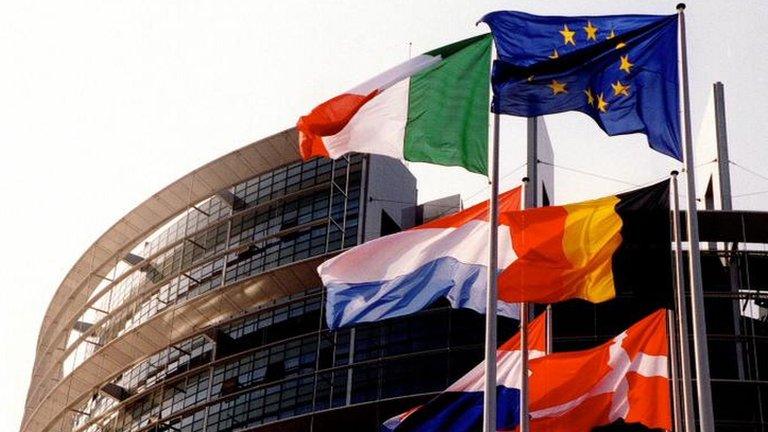Politics and the (EU) law
- Published

The commission spokesman was speaking from the European Parliament in Strasbourg
Politics and the law are two different disciplines. Some politicians are law-makers - and democratic politicians generally seek to operate within the ambit of the law.
But the two functions remain different. Politicians may have a solution to an issue in mind - which they then contrive to achieve, perhaps by amending the law or by causing it to be reinterpreted.
It is sensible to bear this in mind when considering the latest controversy over whether an independent Scotland would be a member of the European Union - and whether such membership, if achieved, would be automatic.
A brief summary. A spokesman for the Commission Olivier Bailly was asked about the secession of part of a member state. The primary context was Catalunya, the autonomous province of Spain centred upon Barcelona. But Scotland was also mentioned.
Mr Bailly suggested yesterday that a new state created by secession would not, upon independence, be a member of the European Union as that state would have to apply for membership under the EU treaties.
Today, Mr Bailly issued a clarification, stressing that the "hypothetical scenario" of part of an EU member state seeking to secede was "first and foremost an internal matter within that member state."
He said that his previous reply had been in response to a "speculative question" from the media - and that it could not be taken as an indication of Commission policy.
Keith Brown: "It is simply our position, and it always has been, that Scotland will accede to the EU simply."
And there is more. My estimable colleague Shaun Ley on the World at One asked the Commission President Manuel Barroso about the issue. Mr Barroso said he was "not going to speculate now about possible secessions".
He went on to outline the procedure for new member states - which is that they have to be democracies, they have to apply and they have to win the consent of all existing member states.
Broadly, the latter answers revert to the status quo ante as far as the Commission is concerned. In a European Parliament answer in February, Commissioner Maros Sefeovie said that the Commission was unable to express a view "given that the terms and result of any future referendum are unknown".
Which leaves us where? With politics rather than the law. See above.
'Adopt Euro'
Nationalists draw upon both disciplines in insisting that an independent Scotland would start out as an existing member of the EU. They cite legal experts - and then argue further that it would be inconceivable that Scotland would be excluded.

Jose Manuel Barroso: "Not going to speculate"
Comparably, Unionists cite other opinions - and then add that there is, at minimum, considerable uncertainty about Scotland's position which, they argue, would be damaging.
There is a further element which is the assertion that if Scotland has to apply as an accession state then she would be obliged to adopt the Euro under EU rules. Scarcely popular, given the present state of the currency.
Nationalists contest that vigorously - again, on two grounds. One, that Scotland would not be a new accession state. Two, that other entrants such as Sweden have, in practice, not had to adopt the single currency.
Let us set aside for a moment the prospect that some voters might be rather happy if they felt that independence would involve withdrawing from the EU.
Let us focus upon the SNP's insistence that EU membership would be automatic - and welcome. Let us consider politics.
Firstly, as noted here before, it is interesting that both sides in the debate tend to waver between political and legalistic responses.
Nationalists say Scotland is already in, legally - and, politically, exclusion would be inconceivable.
Unionists say Scotland might be out, legally - and that other member states with "regional" issues such as Spain would not necessarily wish to encourage the concept of intra-state secession.
EU Commission President Jose Manuel Barroso tells the BBC's Shaun Ley that he is confident the EU will remain "highly relevant" to Europeans
Another point. Might the issue of membership apply also to the rest of the United Kingdom, RUK? Perhaps, if one sought to make the case but, politically, it seems relatively unlikely.
Such a scenario might, arguably, arise if there had been a referendum across the whole of the UK - with Scotland and England both agreeing to end the Union and start anew. That, it might be argued, would be the agreed creation of two entirely new states. Even then, the argument about existing membership would be advanced.
Ready access
The prospect we are considering is that Scotland alone seeks to depart from the existing UK by consequence of a plebiscite among her citizens.
Which leaves us, again, with a question of political trust and credibility rather than legal precision.
Unionists will say that the position is, at least, uncertain - that the Commission has ultimately declined to comment rather than providing a verdict either way. They will argue that Scotland cannot afford to take what, they claim, would be a risk.
Aside from the legal issue, Nationalists will argue that it would be in the interests of the EU to retain Scotland in membership to maintain ready access to Scotland's fish, oil and renewable energy.
They will argue further that, again politically, the EU needs allies, not the exclusion of current citizens.

Could an independent Scotland take its own place in the European Parliament chamber?
There is another issue. Whether membership is retained or sought afresh, it would have to be on agreed terms. Scotland could not adopt the existing UK deal wholesale. She would require to settle issues such as the number of MEPs and, most crucially, the budgetary arrangements with regard to EU funding.
(Equally, of course, it is arguable that the alteration in the status of RUK would involve new terms - most obviously with regard to European Parliamentary numbers but also perhaps re the budget.)
With regard to Scotland, that brings to the fore a further choice which is, once again, political.
Do you, the voters, believe that Scotland would be able to emulate small states like Denmark and Ireland which have been able to punch above their relatively limited apparent weight and secure favourable treatment from the EU?
Or do you believe that Scotland benefits in EU negotiations from the voting clout of the UK?
We may yet have further legal clarification or, one suspects, obfuscation. But the primary driver on this topic will be political, not legal. Either way.
- Published12 September 2012
